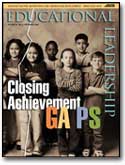Educators working to close achievement gaps will find many resources on the Internet to help them become more informed on statistics, tap into the latest research, and connect with others who are striving for the same goal.
Facts and Figures
The Education Week Web site is a good place to start learning about the achievement gap. In its “Issues: A–Z” section (www.edweek.org/context/topics/issuespage.cfm?id=61), you'll find a comprehensive discussion of the achievement gap with an archive of related Education Week news articles from recent years.
Explore student achievement across the United States by delving into the results of the 2003 National Assessment of Educational Progress. Data analyses are available on the National Center for Education Statistics Web site for both mathematics (www.nces.ed.gov/nationsreportcard/mathematics/results2003) and reading (www.nces.ed.gov/nationsreportcard/reading/results2003). The “Subgroup Results for the Nation” link compares the achievement of various groups of students by gender, race/ethnicity, eligibility for free/reduced-price lunch, parents' education level, type of school, and community type.
The Council of the Great City Schools provides a city-by-city analysis of student performance on state assessments in the fourth edition of Beating the Odds (www.cgcs.org/reports/beat_the_oddsIV.html). The analysis also measures achievement gaps between cities and states, African Americans and whites, and Hispanics and whites.
Research
Visit the Educational Testing Service Web site to download a complete copy of the report Parsing the Achievement Gap (www.ets.org/research/pic/parsing.pdf), which examines conditions that help create and perpetuate achievement gaps. The report identifies factors that account for gaps between minority and white children, ranging from quality of curriculum and teacher preparation to amount of television watched.
Focusing on early childhood, a recent white paper from the American Association of Colleges for Teacher Education examines The Early Childhood Challenge and finds that the achievement gap exists when students arrive at kindergarten (www.aacte.org/press_room/ECEpaper.pdf).
State and Local Efforts
To see what states are doing to close achievement gaps, visit the Education Commission of the States Web site (www.ecs.org/ecsmain.asp?page=/html/issue.asp?issueid=194). Under the “What States Are Doing” section, you'll find information about how Texas, Kentucky, Maryland, Washington, and other states are closing achievement gaps. Visit “Quick Facts” and “Selected Research and Readings” for abundant information about the achievement gap issue.
The Boston Public Schools has a Web site (www.boston.k12.ma.us/gap) featuring information about Boston's recent efforts to measure and close the gaps in each of its schools. Check out a PowerPoint presentation by Superintendent Payzant, titled “Proficiency for All” (www.boston.k12.ma.us/gap/proficiency.ppt) and a special report on closing achievement gaps in special education (www.boston.k12.ma.us/gap/SPED.doc).
Groups Working to Eradicate Achievement Gaps
ASCD has identified the achievement gap as a priority issue for the Association's influence and advocacy activities during the coming year and beyond. In March 2004, the ASCD Leadership Council adopted a position calling for educators, policymakers, and the public to understand the grave consequences of persistent gaps in student achievement and to demand that addressing these gaps becomes a policy and funding priority (www.ascd.org/cms/index.cfm?theviewID=2380). In June 2004, ASCD Executive Director Gene R. Carter called for closing the gap in his monthly editorial, Is It Good for the Kids? (www.ascd.org/cms/index.cfm?theviewID=2503).
The Education Trust is an independent nonprofit organization whose mission is to work for the high academic achievement of all students at all levels and to close existing achievement gaps. The organization's Web site (www.edtrust.org) includes fact sheets and publications about the achievement gap and equity issues as well as a new Spanish-language section to provide resources for Latino parents, community leaders, and advocates (www2.edtrust.org/edtrust/spanish).
The Minority Student Achievement Network is a national coalition of 21 multiracial, urban-suburban school districts across the United States. The Network's mission is to discover, develop, and implement practices to ensure high academic achievement for students of color. Its Web site includes news, research, and promising practices (www.msanetwork.org).
